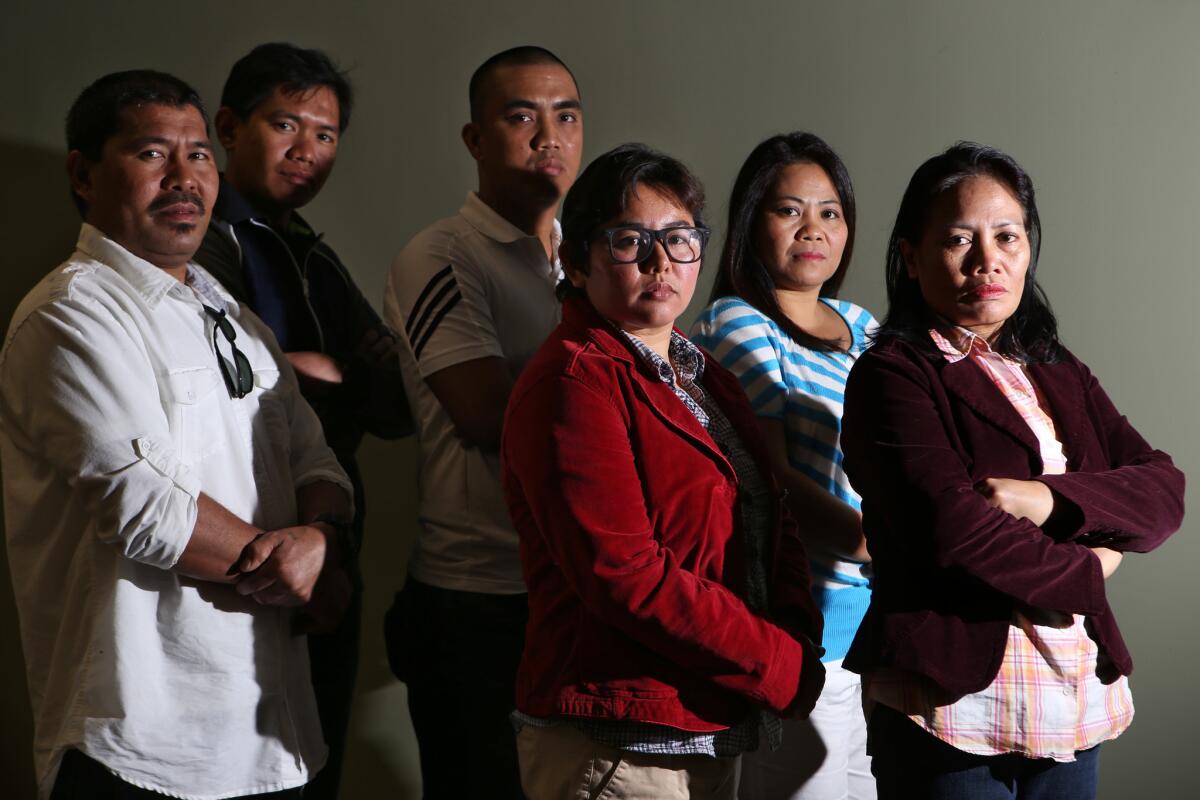Beverly Hills bakery accused of labor abuse by workers on visas

- Share via
The Filipino workers say they were recruited by the bakery owners with a promise: Join us as we launch a new business in the United States, and we’ll double — or even quadruple — your pay.
But when the first workers arrived in Southern California in 2012 under a little-known visa program for foreign investors and their employees, reality set in, according to a lawsuit filed this week by 11 current and former employees of L’Amande French Bakery in Beverly Hills and Torrance.
Bakery owners Ana and Goncal Moitinho de Almeida forced workers to put in 17-hour days for less than minimum wage and no overtime pay, the complaint alleges. It says one worker was paid only $100 for a month’s work.
Additionally, workers said they had to do construction projects at a Long Beach apartment complex owned by the Almeidas as well as cleaning and landscaping at the couple’s Rolling Hills Estates home. For months, workers said, they slept on the floor in the home’s laundry room and were paid just over $2 an hour.
The lawsuit accuses the Almeidas of labor violations, human trafficking, and retaliation after several workers who cooperated with a state investigation of the bakery were fired.
The Almeidas, who did not respond to requests for comment, were ordered last year by the California labor commissioner’s office to pay nearly $250,000 in overtime wages to workers, plus penalties, said Julia Bernstein, a spokeswoman for the California Department of Industrial Relations.
The couple appealed, and a hearing is set for May.
Lawyers for the workers place part of the blame on the temporary worker program that they say the Almeidas all too easily exploited.
Most foreign workers are barred from changing jobs, even if they are underpaid. Those who speak out about labor violations may face retaliation or be sent home.
“Workers are trapped,” said Nicole Gon Ochi, an attorney with the Los Angeles chapter of Asian Americans Advancing Justice, which filed the complaint with the law firm Latham & Watkins. “They’re stuck between a rock and a hard place because their status is tied to their employer.”
The 11 Filipino workers came to the U.S. on E-2 visas, which give immigrants with specialized skills authorization to work for a foreign national who has invested a substantial amount of money in a U.S.-based business.
Federal statistics show the number of E-2 visas issued by the State Department has risen sharply in recent years, from 24,033 in fiscal year 2009 to 35,272 four years later.
But once the workers arrive on U.S. soil, experts said, there is little oversight to make sure they are doing specialized work and are being paid what they were promised.
A patchwork of dozens of unevenly regulated visa categories allow employers to bring foreigners to the U.S.
Some, such as the H-2A program for agricultural guest workers, are overseen by the Department of Labor. Others, including E-2 visas, are administered by the Department of Homeland Security or the State Department, agencies with less experience in labor enforcement.
That opens the door for abuse, advocates say, such as in the case of a Thai national who pleaded guilty in 2010 to underpaying several employees he brought to the U.S. on E-2 visas to work at his restaurant chain in Colorado.
“There’s no end to the creative use and misuse of these programs,” said Cathleen Caron, executive director of Global Worker Justice Alliance, which helps workers who have returned to their home countries with labor claims against U.S. employers.
“Workers are coming for a short amount of time to a place they’ve never been and they don’t know where to turn for help,” Caron said. “Sometimes employers really foster that isolation.”
Bakery worker Louise Luis, 40, said her bosses told workers not to socialize and barred them from leaving the house without permission.
When workers complained, Luis said, the Almeidas told them each worker owed $11,000 for the cost of their visas and airfare. She said the Almeidas threatened to have deported any worker who took part in the state investigation.
“This is not what I signed up for,” said Luis, who spoke Thursday at an emotional news conference with several of her former colleagues.
Labor unions have long called for reform of work visa programs, arguing that they depress wages for U.S. workers and create a group of vulnerable second-class citizens. Business interests say abuse is rare and the visas help buoy the economy.
In November, as a part of a series of executive actions on immigration, President Obama directed federal agencies to outline a plan to streamline and modernize the visa system in part to “combat waste, fraud and abuse.” A working group has not yet made its recommendations public.
Advocates have called for a single visa program, with more oversight, and have pushed to make it easier for workers who report abuse to stay in the U.S. if they are fired.
The bakery workers are seeking T visas, for victims of human trafficking. If they aren’t granted protected status, they will have to go home.
Twitter: @katelinthicum
More to Read
Sign up for Essential California
The most important California stories and recommendations in your inbox every morning.
You may occasionally receive promotional content from the Los Angeles Times.










